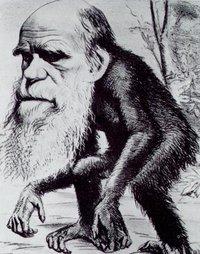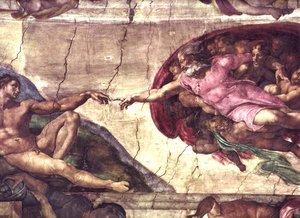Son realmente opuestos el Creacionismo y el Evolucionismo''

La génesis de los organismos vivos es vista a los ojos de la ciencia como emergente de un tronco celular ancestral común, generado a su véz de materia inorgánica. Después de ello y por virtud de exclusivos procesos de complejización y especiación, se irían conformando en forma gradual : peces, reptiles, aves mamiferos, primates superiores hasta la emergencia del hombre moderno actual (Homo sapiens sapiens). Constituyen evidencia de lo anterior, centenares de miles de fósiles datados y documentados : http://es.wikipedia.org/wiki/Charles_Darwin. Esto es en resumidas cuentas, lo que se conoce como Evolucionismo.
Una importante corriente de pensamiento religioso tomó distancia de esta posición, desde que se conoce el mundo, asumiendo que las especies fueron creadas en forma separada por una Voluntad Divina (Creacionismo). La evolución en este caso solo puede darse al interior de especies separadas. Al asumir que cierta especie animal : los seres humanos, fueron creados a imagen y semejanza de esta Voluntad, ponderaron para ella, un
 rol preeminente, en la que es imposible aceptar conversiones de especies inferiores en otras superiores. Cientificamente refrendan este aserto con el argumento de que pese a la existencia de transferencias genéticas horizontales universales (paso de de genes, de una especie a otra), las especies se han mantenido separadas a lo largo de millones de años. Accesoriamente a esta visión central, existe otra visión religiosa, que sí acepta la conversión de especies inferiores en superiores, pero en suertes de ligazones futuristas espirituales :http://www.crosscurrents.org/chardin.htm (Teilhard de Chardin).
rol preeminente, en la que es imposible aceptar conversiones de especies inferiores en otras superiores. Cientificamente refrendan este aserto con el argumento de que pese a la existencia de transferencias genéticas horizontales universales (paso de de genes, de una especie a otra), las especies se han mantenido separadas a lo largo de millones de años. Accesoriamente a esta visión central, existe otra visión religiosa, que sí acepta la conversión de especies inferiores en superiores, pero en suertes de ligazones futuristas espirituales :http://www.crosscurrents.org/chardin.htm (Teilhard de Chardin).En el momento actual, la creación de quimeras, animales transgénicos, clonaciones y múltiples innovaciones genéticas artificiales, constituyen una sólida realidad. Pocos cientificos dudan hoy, que habra interconversión genética de especies, cuando y como se quiera. Hoy mismo existen proyectos muy avanzados para crear vida orgánica (virus y bacterias.Ver nuestro articulo: Creando vida nueva y hasta artificial. XVIII/Julio), con lo que la ciencia, aspecta enormes retos a los postulados de la fé.
No obstante, ningun cientifico puede garantizar un final exitoso para estas innovaciones. ¿No podria suceder al final que quimeras y vidas creadas, se autodestruyan, por problemas de adaptación al entorno?. Sus creadores aducen que no pasará nada.¿es posible que no le suceda nada a un genoma perfectamente sincronizado con su entorno a través de millones de años? Los intercambios genéticos artificiales, ¿no mermarán la plasticidad de los genomas? ¿que garantiza que no será asi?.He aqui, un problema.
De otro lado, las principales teorias centificas en boga, asumen la existencia de un principio, al que denominan big bang o, gran explosión inicial, como origen de nuestro Universo. Curiosamente todas las religiones aceptan tambien una creación inicial, con la única diferencia de que la asumen como dependiente de una Voluntad Divina. Para la ciencia este no es un asunto saldado, en consecuencia no cesará en su empeño de saber que hubo antes del big bang, objetivo para el cual ya tiene cierta perspectiva. He aqui un segundo problema. No obstante, en este punto, emergen más preguntas : ¿de donde salió la materia inicial?¿porque estamos aqui ¿a donde vamos? .
Hay que ser humildes, hay que trabajar con la ciencia, pero no para ella, como un fin. El destino de nuestra especie, vá mucho mas allá de la ciencia. En un mundo en libertad y en tanto sabemos muy poco hay que saber ubicarse. Al lado del libre albedrio para aceptar o no la fé, es necesario ponderar el valor esperanzador, ético y moral que la fé nos proporciona.
Si se mira bien, Ciencia y Religión no son rivales. A su hermanamiento, se oponen fundamentalismos humanos, de todo tipo. Ciencia y Religión, no conllevan puntos de vista necesariamente opuestos, si cada uno reconoce sus espacios (acordarse de los avatares de Copérnico) y, si la búsqueda de la verdad es ética, honesta y absolutamente desprejuiciada.
Really, the Creationism and the Evolutionism are opposed?
The génesis of the alive organisms is seen to the eyes of science like emergent of a common ancestral cellular trunk, generated some time before from inorganic matter. After it and by virtue of exclusive processes of more complexity and speciation, they would have been transformed in gradual form: in fish, reptiles, birds, mammals, superior primates until the emergency of the present modern man (Homo sapiens sapiens). Constitute evidence of the previous thing, hundreds of thousand of fossils dated and documented: http://es.wikipedia.org/wiki/Charles_Darwin. This is in short, known as Evolutionism.
An important current of religious thought took distance from this position, since the world is known, assuming that the species were created in separated form by a Divine Will (Creationism). The evolution in this single case can occur only in the interior of separated species. When assuming that certain animal species: the human beings, were created to image and similarity of this Will, weighed for her, an preeminent roll, in which is impossible to accept conversions of inferior species in other superior ones. Scientifically, authenticates this assertion with the argument of which in spite of the existence of world wide horizontal genetic transferences (passage of of genes, from a species to another one), the species have stayed separated throughout million years. Accessoryly to this central vision, another religious vision, accepts the conversion of inferior species in superior, but in a luck of spiritual futurist attachments exists:http://www.crosscurrents.org/chardin.htm (Teilhard de Chardin).At the present moment, the transgénics, the creation of chimeras, clonations and manifold artificial genetic innovations, constitute a solid reality. Few scientific will doubt, that today genetic interconversion of species, will occur, when and as it is wanted. Today some very advanced projects exist to create organic life (virus and bacterias. See our article: Creating new life and until artificial. XVIII/Julio), with which science, aspect enormous challenges to the postulates of faith.
The génesis of the alive organisms is seen to the eyes of science like emergent of a common ancestral cellular trunk, generated some time before from inorganic matter. After it and by virtue of exclusive processes of more complexity and speciation, they would have been transformed in gradual form: in fish, reptiles, birds, mammals, superior primates until the emergency of the present modern man (Homo sapiens sapiens). Constitute evidence of the previous thing, hundreds of thousand of fossils dated and documented: http://es.wikipedia.org/wiki/Charles_Darwin. This is in short, known as Evolutionism.
An important current of religious thought took distance from this position, since the world is known, assuming that the species were created in separated form by a Divine Will (Creationism). The evolution in this single case can occur only in the interior of separated species. When assuming that certain animal species: the human beings, were created to image and similarity of this Will, weighed for her, an preeminent roll, in which is impossible to accept conversions of inferior species in other superior ones. Scientifically, authenticates this assertion with the argument of which in spite of the existence of world wide horizontal genetic transferences (passage of of genes, from a species to another one), the species have stayed separated throughout million years. Accessoryly to this central vision, another religious vision, accepts the conversion of inferior species in superior, but in a luck of spiritual futurist attachments exists:http://www.crosscurrents.org/chardin.htm (Teilhard de Chardin).At the present moment, the transgénics, the creation of chimeras, clonations and manifold artificial genetic innovations, constitute a solid reality. Few scientific will doubt, that today genetic interconversion of species, will occur, when and as it is wanted. Today some very advanced projects exist to create organic life (virus and bacterias. See our article: Creating new life and until artificial. XVIII/Julio), with which science, aspect enormous challenges to the postulates of faith.
However, no one scientific can guarantee a successful end for these innovations. It could happen that chimeras and lives in the end created, will be self destroyed, by problems of adaptation to the surroundings. Their creators adduce that it will not pass anything. it is possible that nothing happens to it? to a perfectly synchronous genome to its surroundings through million years? The artificial genetic interchanges, will not decrease the plasticity of the genomes? What is the guarantee that will nothing happen?.Here, there are a problem.
Of another side, main scientific theories, assume the existence of a beginning, to what denominate big bang or, great initial burst, originating our Universe. Peculiarly all the religions accept also an initial creation, with the only difference of which they assume it like employee a Divine Will. For science this it is not a settled subject, consequently will not stop in his persistence of knowledge about what was before big bang, objective for which already has certain perspective. There are, here a second problem. However, in this point, more questions emerge:¿where it left the initial matter? Where are we going? Why are we here?.
It is necessary to be humble, is necessary to work with science, but does not converet it in an aim. The destiny of our species, is much beyond of science. In a world in freedom and in as much as we know very little is necessary to know how to be located. Next to free will to accept or not the faith, it is necessary to weigh the hopeful, ethical and moral value that faith provides us.
If it is watched well, Science and Religion are not rival. Against to their brotherhood hermanamiento, are human fundamentalisms of all type. Science and Religion, do not entail necessarily opposite points of view, if each one recognizes its spaces (remember the ups and downs of Copérnico) and, if the search of the truth is ethical, honest and absolutely unaffected.
Of another side, main scientific theories, assume the existence of a beginning, to what denominate big bang or, great initial burst, originating our Universe. Peculiarly all the religions accept also an initial creation, with the only difference of which they assume it like employee a Divine Will. For science this it is not a settled subject, consequently will not stop in his persistence of knowledge about what was before big bang, objective for which already has certain perspective. There are, here a second problem. However, in this point, more questions emerge:¿where it left the initial matter? Where are we going? Why are we here?.
It is necessary to be humble, is necessary to work with science, but does not converet it in an aim. The destiny of our species, is much beyond of science. In a world in freedom and in as much as we know very little is necessary to know how to be located. Next to free will to accept or not the faith, it is necessary to weigh the hopeful, ethical and moral value that faith provides us.
If it is watched well, Science and Religion are not rival. Against to their brotherhood hermanamiento, are human fundamentalisms of all type. Science and Religion, do not entail necessarily opposite points of view, if each one recognizes its spaces (remember the ups and downs of Copérnico) and, if the search of the truth is ethical, honest and absolutely unaffected.



.+Photo+Author.jpg)



0 Comments:
Post a Comment
<< Home